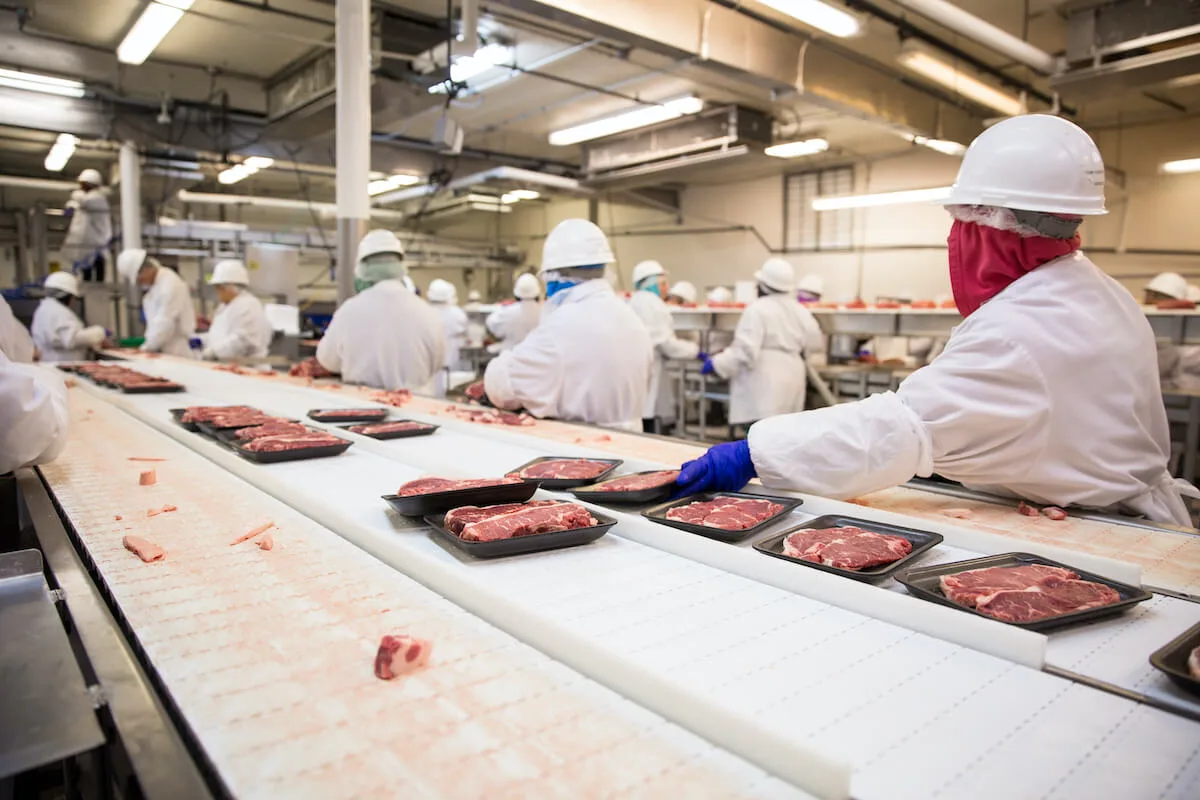
#image_title
#image_title
Almost a quarter of the 1,200 employees at JBS Packerland have coronavirus, but not all were tested before the plant was shut down.
Brown County’s health department apparently will not ask meat processing corporation JBS Packerland to resume testing its 1,200 employees in Green Bay after nearly a quarter of them tested positive for coronavirus.
“It would be up to JBS,” said Claire Paprocki, Brown County public health strategist. “Ultimately, we can’t force anybody to do testing at their facilities.”
She would not say whether the county wants JBS to test all employees or whether it would put pressure on the company to do so. Brown County has been grappling with an explosion in cases at three different meat processing facilities. More than half of the county’s 971 cases are among meatpacking employees or those in contact with employees.
JBS Packerland is currently closed and has stopped testing its employees, even though 262 had contracted coronavirus and another 86 cases were linked to the employees as of Wednesday, according to numbers released by Brown County.
Citing the plant’s temporary closure, JBS spokesman Cameron Bruett wrote in an email to UpNorthNews that employees “will now effectively undergo quarantine” because they will not be showing up to work. Bruett did not answer whether the company would resume testing, nor did he provide the number of tests administered.
A JBS plant in Colorado reopened last Friday without testing all employees, according to Colorado Public Radio. Five JBS employees in Colorado died of COVID-19 and 245 in total were infected, according to state infection data. That plant has 6,000 employees, making it the largest employer in its county.
During a news conference Wednesday, Gov. Tony Evers and state Department of Health Services Secretary-designee Andrea Palm said they are working with meatpacking plants in Brown County and elsewhere to test and assess the degree of COVID-19 at the sites in Brown County. But they said the Occupational Health and Safety Administration has final say over investigations into those outbreaks.
“We are doing everything in our power to get every one of these employees tested,” Evers said.
OSHA is investigating allegations that the company failed to adequately protect employees’ health in Green Bay. A complaint to OSHA says JBS did not give face coverings for all its workers, did not ensure six feet of space between employees, and did not inform employees when coworkers had tested positive for coronavirus.
OSHA is also investigating American Foods Group, which has three locations in Green Bay with 170 coronavirus-positive employees and another 27 linked cases. The company has roughly 1,500 employees.
“There is a lot of fear,” said Filiberto Reyes-Martinez, an AFG employee who says the company sent him home a week ago for raising concerns about the conditions in his workplace. He said human resources has not contacted him to tell him when he can come back to work.
Reyes-Martinez spoke Wednesday afternoon at a press conference hosted by advocacy group Voces de la Frontera, which has filed complaints on behalf of employees at JBS, AFG, and several other food plants across the state. Employees and relatives of employees at other plants also spoke.
“When a worker gets this, their family gets it,” said Christine Neumann-Oritz, executive director of Voces de la Frontera.
President Donald Trump on Tuesday issued an order under the Defense Production Act to force meat processing plants to remain open. Neumann-Ortiz called the order “shameful,” saying it puts workers at needless risk.
Rep. Chris Sinicki, D-Milwaukee, said she worries about the safety of workers in food processing plants returning to work without more knowledge of how many of them have COVID-19. Failure to test all workers at plants where outbreaks have occurred could lead to further spikes of the virus, she said.
“They say they will (use) proper social distancing for the workers,” said Sinicki, whose 20th Assembly district is home to the Patrick Cudahy plant where OSHA is investigating a COVID-19 outbreak. “But that is really hard to do in any meatpacking plant where people work close together.”
Stephanie Bloomingdale, AFL-CIO Wisconsin president, echoed that sentiment, saying forcing employees to return to work at food processing plants where COVID-19 cases have occurred without more testing information simply isn’t safe.
“Making these employees return to work with this outbreak of the virus is dangerous for them and for the food supply,” she said.
As of Tuesday, OSHA was conducting investigations into coronavirus-related complaints at 74 Wisconsin facilities, a Department of Labor spokesperson wrote in an email. Nine of those facilities are meat processing plants. OSHA investigates every complaint, but does not perform inspections at every site.
Meanwhile, Sen. Tammy Baldwin is calling for an anti-trust investigation into the consolidation of power in the meatpacking industry. Baldwin, a Democrat, is joining Missouri Republican Sen. Josh Hawley in asking the Federal Trade Commission to examine whether the small number of large corporate processors has exacerbated the disruption to America’s food chain during the pandemic.
In a letter to the FTC commissioners, the Senators note that only 4 companies control 85 percent of all beef processing the U.S. JBS is based in Brazil, Smithfield is Chinese-owned, Cargill and Tyson are U.S.-based. They say the consolidation of the industry has led to fewer but much larger slaughterhouses, and a disruption at any of them can undermine America’s meat supply. In addition, they point out examples of how farmers and ranchers continue getting paid less per pound for their livestock even as retail prices have gone up.
UpNorthNews reporter Julian Emerson contributed to this report.
Politics

Opinion: Many reasons why young adults should refuse to let Republicans kill the Affordable Care Act
In this op-ed, University of Wisconsin Medical School student, Samantha Crowley, shares the importance of young adults protecting the Affordable...

He said what? 10 things to know about RFK Jr.
The Kennedy family has long been considered “Democratic royalty.” But Robert F. Kennedy, Jr.—son of Robert F. Kennedy, who was assassinated while...
Local News

Stop and smell these native Wisconsin flowers this Earth Day
Spring has sprung — and here in Wisconsin, the signs are everywhere! From warmer weather and longer days to birds returning to your backyard trees....

Your guide to the 2024 Blue Ox Music Festival in Eau Claire
Eau Claire and art go hand in hand. The city is home to a multitude of sculptures, murals, and music events — including several annual showcases,...




